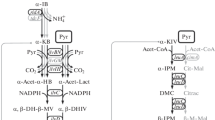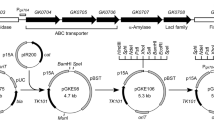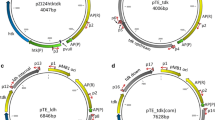Abstract
We constructed recombinant plasmids carrying the genes coding for the L-threonine biosynthetic enzymes, the hom gene, the hom-thrC genes, and the thrB genes, of a gram-negative obligate methylotroph, Methylobacillus glycogenes, and examined the effects of them on the production of L-threonine from methanol. The hom gene, which encodes the homoserine dehydrogenase, and the hom-thrC genes, containing the gene coding for threonine synthase together with the hom gene, were cloned from a wild-type strain, and the thrB gene encoding the desensitized homoserine kinase was cloned from an L-threonine-producing mutant, ATR80. The recombinant plasmids were transferred into ATR80 and its L-isoleucine auxotroph, A513, by conjugation. Amplification of the genes coding for the L-threonine biosynthetic enzymes elevated the activities of the L-threonine biosynthetic enzymes of the transconjugants 10- to 30-fold over those of the strains containing only vectors. The L-threonine production from methanol in test-tube cultivation was increased about 30% and 40% by the amplification of the hom gene and the hom-thrC gene respectively, and it was slightly increased by that of the thrB gene. The effects of gene amplification were confirmed by the cultivation in 5-1 jar fermentors. The best producer, an A513 transconjugant containing the plasmid carrying the hom-thrC genes, produced 16.3 g/l L-threonine for 72 h.
Similar content being viewed by others
References
Allen LN, Hanson RS (1985) Construction of broad-host-range cosmid cloning vectors: identification of genes necessary for growth of Methylobacterium organophilum on methanol. J Bacteriol 161:955–962
Beppu T (1986) Application of recombinant DNA technology of breeding of amino acid-producing strains. In: Aida K, Chibata I, Nakayama K, Takinami K, Yamada H (eds) Biotechnology of amino acid production. Kodansha/Elsevier, Tokyo, pp 24–48
Finch PW, Brough CL, Emmerson PT (1986) Molecular cloning of a recA-like gene of Methylophilus methylotrophus and identification of its product. Gene 44:47–53
Fukuda M (1990) Iden 44: Nov 53–58. Kosyukusyuiki vector no kaihatsu to ohyo (in Japanese)
Katsumata R, Mizukami T, Kikuchi Y, Kino K (1986) Threonine production by the lysine producing strain of Corynebacterium glutamicum with amplified threonine biosynthetic operon. In: Alacevic M, Hranueli D, Toman Z (eds) Genetics of industrial microorganisms. Pliva, Zagreb, pp 217–226
Lidstrom ME, Tsygankov YD (1991) Molecular genetics of methylotrophic bacteria. In: Goldberg I Rokem JS (eds) Biology of methylotrophs. Butterworth-Heinemann, Mass., pp 273–304
Maniatis T, Fritsch EF, Sambrook J (1982) Molecular cloning. A laboratory manual. Cold Spring, Harbor Laboratory Press, Cold Spring Harbor, New York
Marchenko G, Tsygankov Y (1992) Genes for threonine biosynthesis in Methylobacillus flagellatum (abstract B79) In: Proceeding of the 7tg International Symposium on Microbial Growth on C1 Compounds. Warwick (England) Aug 15–20.
Mazodier P, Biville F, Turfin E, Gasser F (1988) Localization of a pyrroloquinoline quinone biosynthesis gene near the methanol dehydrogenase structural gene in Methylobacterium organophilum DSM 760. J Gen Microbiol 134:2513–2524
Motoyoma H, Anazawa H, Katsumata R, Araki K, Teshiba S (1993a) Amino acid production from methanol by Methylobacillus glycogenes mutants: isolation of L-glutamic acid hyper-producing mutants from M. glycogenes strains, and derivation of L-threonine and L-lysine-producing mutants from them. Biosci Biotechnol Biochem 57:82–87
Motoyama H, Anazawa H, Teshiba S (1993b) Characterization of the aspartate family amino acids biosynthetic enzymes in L-threonine-and L-lysine-producing mutants of Methylobacillus glycogenes. Biosci Biotechnol Biochem 57:461–466
Motoyama H, Maki K, Anazawa H, Ishino S Teshiba S (1994) Cloning and nucleotide sequences of the homoserine dehydrogenase genes (hom) and the threonine synthase genes (thrC) of the gram-negative obligate methylotroph Methylobacillus glycogenes. Appl Environ Microbiol 60:111–119
Skarstedt MT, Greer SB (1973) Threonine synthetase of Bacillus subtilis. J Biol Chem 248:1032–1044
Simon R (1984) High frequency mobilization of gram-negative bacterial replicons by the in vitro constructed Tn5-Mob transposon. Mol Gen Genet 196:413–420
Vries GE de, Harms N, Hoogendijk J, Stouthamer AH (1989) Isolation and characterization of Paracoccus denitrificans mutants with increased conjugation frequencies and pleiotropic loss of a (nGATCn) DNA-modifying property. Arch Microbiol 152:52–57
Yanisch-Perron C, Vieira J, Messing J (1985) Improved M13 phage vectors and host strains: nucleotide sequence of the M13mp 18 and pUC 19 vectors. Gene 33:103–119
Author information
Authors and Affiliations
Rights and permissions
About this article
Cite this article
Motoyama, H., Yano, H., Ishino, S. et al. Effects of the amplification of the genes coding for the L-threonine biosynthetic enzymes on the L-threonine production from methanol by a gram-negative obligate methylotroph, Methylobacillus glycogenes . Appl Microbiol Biotechnol 42, 67–72 (1994). https://doi.org/10.1007/BF00170226
Received:
Revised:
Accepted:
Issue Date:
DOI: https://doi.org/10.1007/BF00170226




